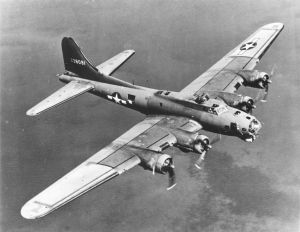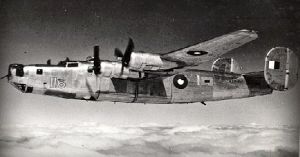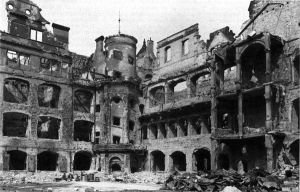
Down That Lonesome Road
Yet more than eighty people, David Cohen and other townspeople among them, came along to ease Mitch and Cat down that lonesome road with their respect and friendship and love. The two men had almost completed the last handshakes and hugs when the big Military Transport Command plane turned up-wind and let down for its landing.

B-17 "Flying Fortress"
Copyright Queensland Newspapers Pty Ltd
The MTC was a survivor of the war that carried priority personnel, documents and freight. Very early every morning, before first light, one of them left Washington, D.C., and another departed San Francisco. Each flew a stretched-out block U that took them to San Diego, Jacksonville, Mobile, Texas, and New Orleans on the way to the other coast. The planes were an eclectic mix of paratrooper transports, cargo freighters and converted bombers. The Air Force and the Navy alternated crews on a weekly basis, and hence the flights also served as an informal interservice transmission belt for rumor and gossip. Thus the incoming pilot was aware of the stories about the two men he was about to take aboard.
The much-decorated Colonel Clifford Nord had earned a reputation as a man who could fly any four-engined plane almost anyplace, anytime in any weather-and into and out of flak and fighters. It was even said that he could fly the lumbering, lurching boxcar known as The Liberator in a straight line. Until a month or so after the war, he had been considered by his superiors, as well as his air and ground crews, an exceptional officer who would skip up the stairs to the stars. Then, while home on leave, the war caught up with him.

B-24 "Liberator"
The vague uneasiness, so much a part of all confrontations between nostalgia and reality, began to seep into his mind as the train from San Francisco slowed down through the Wyoming Range and past Fossil Butte to the small town that once had been a railroad and mining center. The community had provided an integral part of a relaxed childhood, and Nord began to reexplore its history with his parents the first night. His mother at first monopolized the conversation with proud talk about Wyoming giving women the right to vote in 1869 and electing the first female governor in 1925.
Nord enjoyed listening to his mother; had come to like her for her feisty social engagement as well as her capacity for friendship, but he knew there was a dark side to life in northwestern Wyoming. Her friendly, almost naive, hubris began to make him impatient. Also, apparently, his father. He poured some whiskey and interrupted: "It's not all that pretty, Frances."
He then told, at first with quiet shame and then with increasing anger, his stories about the terrible mistreatment of and ultimate killing of the Chinese who had hammered the spikes and dug the coal.
Later that night Nord walked alone through the quiet town and around its attractive square, stopping long moments at what was left -a Chinese laundry and repair shop, and a restaurant. Hours later he flailed and bawled his way out of his first nightmare about his part in the fire bombings of Tokyo, and his revulsion about the bombs dropped on Hiroshima and Nagasaki.
That might have been an end to it if a few days later David Webb, his best friend from first grade through high school, and also a bomber pilot, had not also come home. It went easy at first; slightly drunk flying with their hands and comparing the trials and tribulations of flying over Germany and Japan.
Then they went hunting. Nord was out on the flank hoping to move a buck toward Webb. And there it was -a magnificent mature animal in a small clearing. Webb centered it in his scope and held and held and held. Finally he dropped his rifle, began to sob and collapsed.
"I can't do it, Cliff. I can't do it...can't do it."
As Nord helped him home, the cold sober daytime terrors kept Webb shaking and trembling and crying. He had been part of all the fire bombings of Dresden. Over and over in his horror and guilt he spoke one line.
"Oh, God, Cliff, we were murdering the dead...murdering the dead... murdering the dead...."

Ruins of Dresden, February 1945
Courtesy Jan Enberg
Three days later, sitting along the river in the morning mist, having just released a trout from a barbless fly, Webb shot himself in the heart.
Table of Contents
- Maggie and Mr. Hank
- The Reverend
- Squalls Along the Flight Line
- Flying Home to Church
- A Visit with The Judge
- Communion
- Afterthoughts
- Monday Morning With The Admiral
- Into the Dining Room
- On Toward Walking the Streets
- Glimpses of An Election
- The Dream and The Reality of Violence
- The Admiral Loses More Than a Few Good Men
- Down That Lonesome Road

